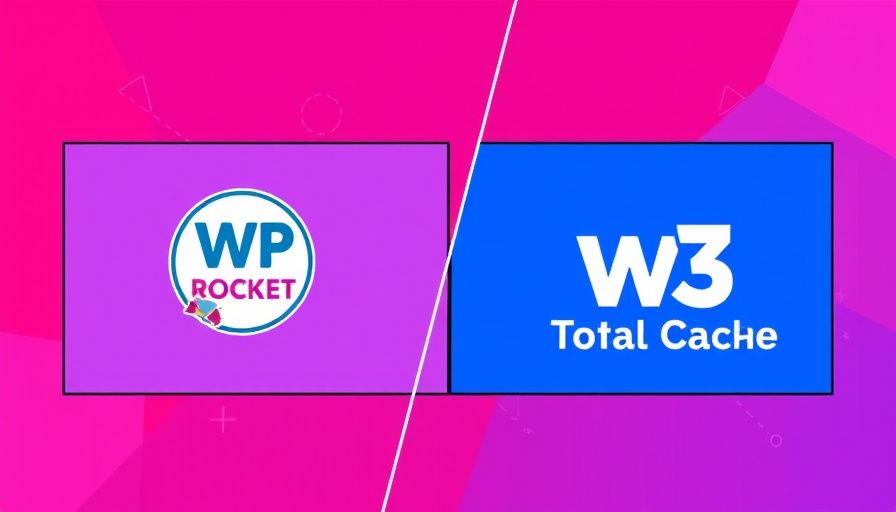
Why Focusing on Page Load Speed Matters
The digital landscape is unforgiving—users expect websites to load at lightning speed. Did you know that nearly half of web users will abandon a site if it takes longer than three seconds to load? This statistic emphasizes the importance of page load speed. An unresponsive website not only frustrates visitors but can also significantly harm your site's rankings on search engines like Google, ultimately affecting conversions and revenue. To retain visitors and enhance user experience, optimizing website speed isn’t just a suggestion—it’s a necessity.
Understanding Page Speed: The Metrics That Matter
Page speed isn’t a single number; it consists of various metrics, including First Contentful Paint (FCP), Time to Interactive (TTI), and Speed Index. FCP indicates how quickly content appears on the screen, while TTI measures when a webpage becomes fully interactive. Understanding these metrics is crucial for identifying areas needing improvement. Additionally, tools like Google PageSpeed Insights can help in monitoring and analyzing your website’s performance.
How to Test Your Website’s Speed
Regularly testing your website’s load speed is essential to stay on top of performance. Use trusted tools such as GTmetrix, Pingdom, or WebPageTest to get an accurate measurement of your site's speed. These platforms not only provide load times but also offer insights on optimization opportunities, helping you gauge whether your efforts are paying off.
Actionable Steps to Improve Website Page Load Speed
Here are nine essential strategies to expedite your website:
- 1. Choose the Right Hosting Provider: Your hosting service can significantly impact site speed. Opt for quality managed WordPress hosting that specializes in speed and reliability.
- 2. Optimize Your Images: Large image files can slow down your website. Utilize image optimization tools that compress files without compromising quality.
- 3. Use a Content Delivery Network (CDN): A CDN stores copies of your site on multiple servers worldwide, speeding up delivery to users based on their geographic location.
- 4. Enable Gzip Compression: Gzip reduces the size of your files, enabling faster transfers between the server and the browser. This can lead to significant load time reductions.
- 5. Minify JavaScript, CSS, and HTML: Reducing the size of your code files can eliminate unnecessary spaces and comments, which contributes to faster load times.
- 6. Use Caching: Implement caching strategies that store static versions of your web pages to serve users more quickly on repeat visits.
- 7. Use Lazy Loading for Images and Videos: Lazy loading ensures that images and videos are only loaded when they are needed, which can greatly enhance initial page speed.
- 8. Eliminate Unnecessary Plugins: Too many plugins can bog down your site. Audit and remove any that you don’t truly need.
- 9. Pick the Right Theme: Choose a lightweight, well-coded theme for your WordPress site to avoid unnecessary overhead, which can also improve speed.
Future Predictions and Insights for Website Optimizations
As technology evolves, so do the expectations for website performance. New techniques such as HTTP/3 are emerging to enhance speed further, while the rise of artificial intelligence may introduce intelligent load balancing and content delivery strategies. Staying ahead of trends ensures your site remains competitive in a fast-paced digital world.
Common Misconceptions About Website Speed Optimization
It’s a common myth that only technical experts can improve website speed, but many optimizations are user-friendly and straightforward. Simple strategies, like optimizing images or selecting a good hosting provider, can be executed by virtually anyone. Recognizing these actionable steps is vital for WordPress users to create efficient sites.
Take Action: Optimize Your Website Today!
Improving your website's load speed is crucial not only for user satisfaction but also for maximizing conversions and SEO performance. Don’t wait until you lose traffic; take proactive steps to implement these strategies today. Your website will not only load faster but also engage users more effectively, providing a seamless browsing experience.
 Add Row
Add Row  Add
Add 




 Add Row
Add Row  Add
Add 

Write A Comment